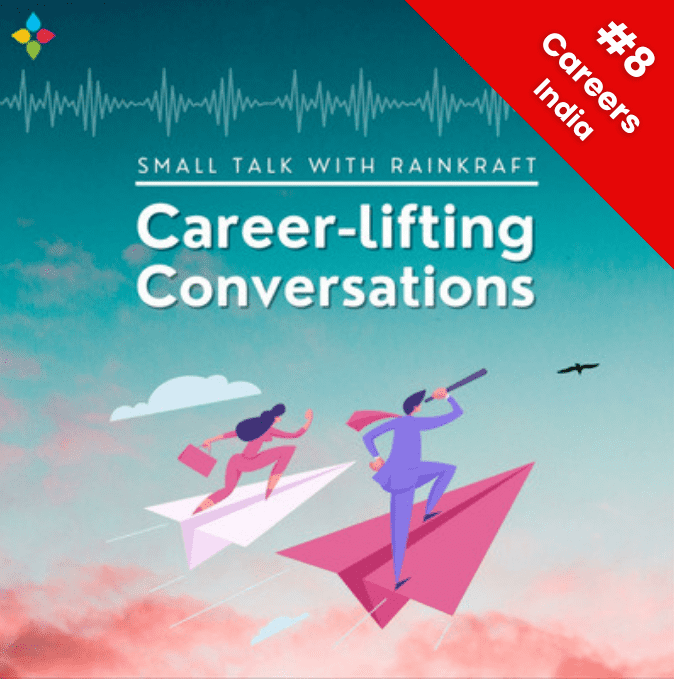S3E3 – How To Focus When You’re Chronically Distracted
When was the last time one Insta reel led to another and 20min later you are wondering why you are watching kitchen remodeling videos? When was the last time just a glance at the latest ping on your phone didn’t lead to checking messages on four other Whatsapp groups? When was the last time you had a video conversation where you did nothing but watch the speaker and listen, without a silent toggle to another tab? In this episode of Small Talk with RainKraft, Subha and Hasita talk about why focus tools and techniques fail so often and think about guilt-free ways to focus, while also having fun. Can the focus be just on doing something deeply for a significant period of time? Does focus have to lead to productivity? And why the ‘put-your-phone-away’ line of advice is nearly impossible for most of us. Tune in!
Table of Contents
Discussion Topics: How to focus when you’re chronically distracted
- How modern day’s attention is going
- The difference in respond system when you are not focused
- Two kinds of focus that can help you
- Using technology for focus
Transcript: How to focus when you’re chronically distracted
Subha: When was the last time you did just one thing? I don’t think I know how to do that. Let’s see, on my evening walk, I listen to books and podcasts. When I’m on a call with Bluetooth headphones, I usually catch up on email too. Even when I water my plants, I’m probably speaking to a friend on the phone. And it’s showing in my attention span two things, my ability to read books for an extended period. And I think even my memory, sometimes someone’s just told me where they work or what they do, and I forgot.
Hasita: Subha, you are literally vocalizing my own lived experience, I have jumped from one call to the other in a way that the second call has already started. And the first one is not over yet. And I’m logged in from two different devices. I take months to finish books now. Previously, it could be hours, and even when I’m waiting for a call or have a meeting at a coffee shop, my immediate instinct is to just scroll Instagram for absolutely no good reason, just to kill time. So Subha, I’m very curious to know what sparked this thought for you at this particular point in time.
Subha: I came across one book recommendation, Oliver Burkeman’s 4000 Weeks. Now I managed to read through that book. It’s actually quite breezy, and it’s not very tedious. But my takeaway was the title, more than anything else. It’s a book about having 4000 weeks for people assuming you live up to 80. Having 2000 weeks left in my life, makes me want to focus on the things that matter to me. And then I came across a book called Stolen Focus by Johann Hari that said that teenagers can focus on one task for about 65 seconds and office workers can focus for about 3 minutes.
Hasita: But then we live in a world that praises multi-tasking skills. People take pride in being able to multi-task and the system is designed that way as well. For example, I might have decided to focus on something and I’m in the middle of it and the client calls multiple times, do I or do I not pick up? So, the system, the environment itself is designed to multi-task. Where do I focus?
Subha: You’re right. I used to think my superpower is multi-tasking. Client calls can definitely steal your focus from what you’re doing and it’s not as simple as saying don’t pick up the call. I think we both have talked about and written about a lot of things or ways to get more work done and how to be more productive. First, we need to understand why focus is very important. It’s not squeezing 10 hours of work into 4 hours and feeling good about yourself. It is leading to changes in our brains, and our bodies and we are passing this on to the next generation.
Hasita: You may be getting somewhere more than the focus or being productive. Not being able to focus on something is one of the most fundamentally unfulfilling experiences I’ve personally had. I feel like our brains are built to handle one thing at a time.
Subha: You’re right. We get onto the phone when we are riding the elevator because we think we’re missing out on something, some notification, something super important happening in the world. However, by doing that, you are missing out on the present moment of riding the elevator. You don’t know what sound it is playing in that 30 secs because you are not paying attention.
Johann Harri says that when you don’t give something focus and attention when everything is in a state of agitation or a state of anxiety, it leads to either a simplistic situation as the brain power is not put into it or it leads to very angry situations with heat of the moment reactions to things because kindness and empathy are forms of behavior that need deep attention.
Hasita: It’s interesting. I was at a clinic for an appointment when this person helping me started a conversation about my tattoos. I was a little conscious at first. But because I just got in and my attention is not all over the place, I began to realise he was just trying to make a conversation. In any other circumstances with my focus somewhere else, I would have brushed him off rudely but being aware of the present moment helped me realise how to respond.
Subha: There are two kinds of focus that can help us. One is spotlight focus: shutting everything out and focusing on the task that you’re doing. Like if you are talking, paying attention to the conversation, and ignoring the other things. The second kind is not focusing on one thing but letting your mind wander until it finds something it wants to focus on and dig deeper. We are not doing either of that. We are switching tasks from tasks and it impacts our memory, attention spans, and the quality of work.
Hasita: I’m honestly tired of solutions that say to put your phone away. Applications to set the amount of time you could pick up your phone are not sustainable solutions because not everyone can be away from the phone.
Subha: Yeah. I don’t get the solutions that he talks about or he implements. For example, he got a safe with a timer that you can put your phone inside for your desired duration and you can’t take it out before the time is up. With life and work being evolved around technology, I couldn’t leave the phone away in the other room for an hour. The children at school might need attention, the delivery might need to contact me.
Focusing is not only about doing something you like but also learning that focusing skill again. We’ve gone through the pomodoros, the Cal Newport, and time block planning but sometimes you don’t know how to do one thing for 90 minutes. So, in terms of what we can practically do: first, we need to train the muscle and learn to focus again. And then we get into asking if we are being productive or useful to the world.
Getting into flow is a concept that stayed with me. We all have something we started doing and didn’t realize it was 2 hours already. When I first started RainKraft, I taught myself how to do the website with WordPress. I started tinkering and I got into a zone or flow for an hour or two without wanting to check my phone or emails. So we all have certain tasks which get us into the flow and we need to choose one thing you enjoy doing first to train that muscle. It is not as simple as it sounds because you need to choose something that needs you to concentrate or pick up a skill or go deeper that pushes you into the flow. Then, you can make a slightly stretch assignment for yourself to take you into flow just a little bit.
Hasita: Absolutely. It also doesn’t have to be something you haven’t tried before. Like drawing with watercolor when you have never touched them in your life. Social media tells us that there’s a certain list of activities that are more mindful than the others but so is my daily walk or meditation routine or cooking. Leveling up those activities could be a much lower-stretched goal before you can go out and conquer the world.
Subha: I think you hit the nail. It’s about doing things that will help you slow down, work the muscle that allows you to pay attention, and not be in a state of high anxiety all the time with the things you might be missing out.
Let’s see how much we can work that focus muscle over the next few weeks and let our small talkers know how we felt.
Both: Sounds good. See you next time.



